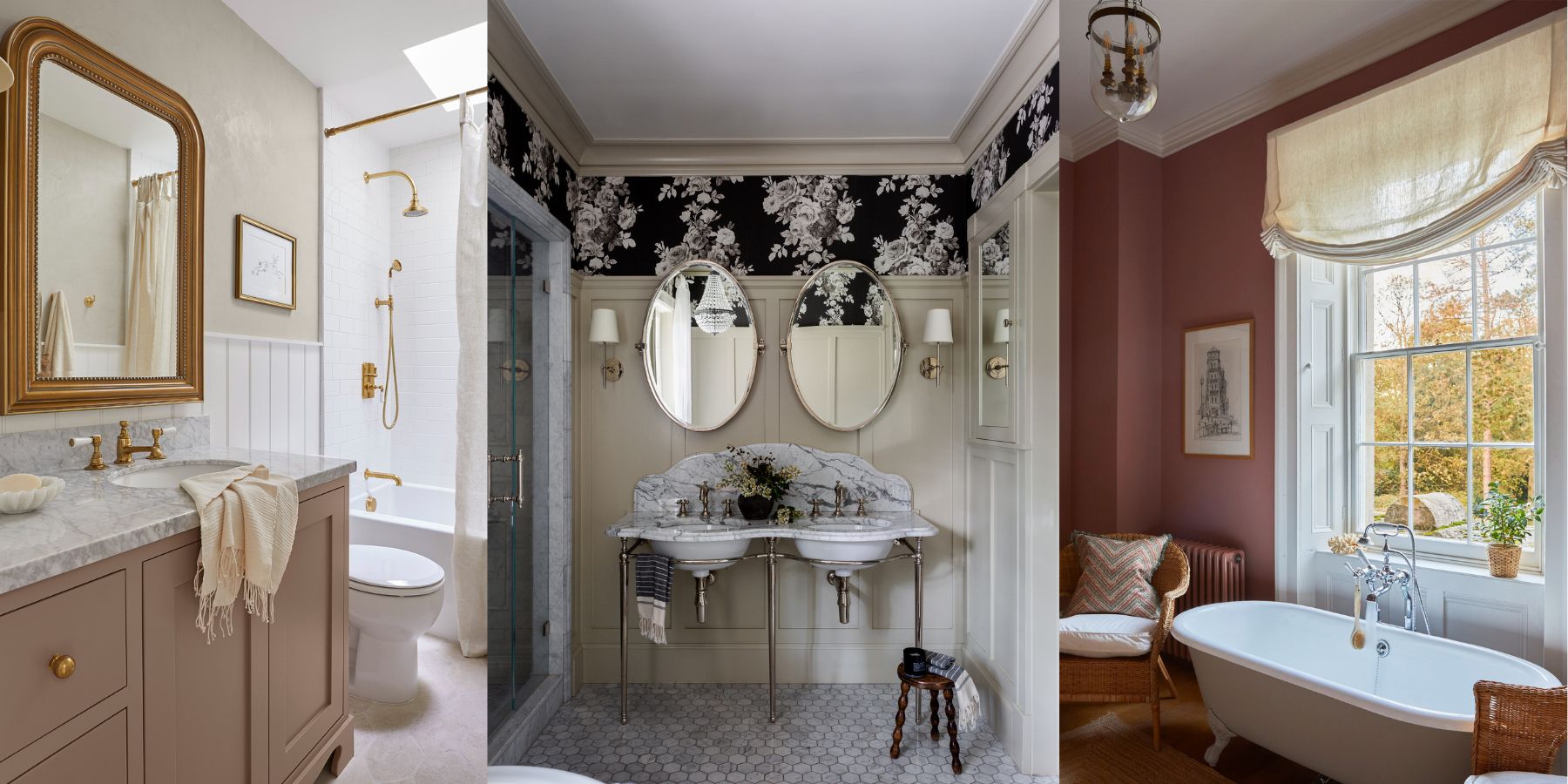
Creating a bathroom that feels comforting and relaxing can be a challenge. As foremost practical spaces, bathrooms more than any other room can easily feel cold, sterile, and unwelcoming. Their multitude of hard, water-resistant surfaces, crisp white sanitaryware and sharp angles can leave spaces feeling stark and lacking in personality.
As bathrooms are often smaller than other rooms in the house they can also be easily overlooked when it comes to decorating and it can be tricky to know how to bring character. However, with some clever planning and advice, there are ways to strike the balance between practical and pretty and to achieve a soothing bathroom perfect for whiling away the hours which is far from cold and clinical.
How to design a bathroom that doesn’t feel sterile
Whether you’re starting a completely new bathroom redesign or simply looking to make some quick updates, bathrooms needn't be boring - there are plenty of ways to prevent the space from becoming a stark white box. To help you with your project we’ve rounded up an array of beautiful, welcoming projects brimming with character along with expert advice on how to design a bathroom with warmth, from bathroom color ideas to bathroom tiles, lighting and finishing touches.
1. Layer warm, natural materials and textured surfaces
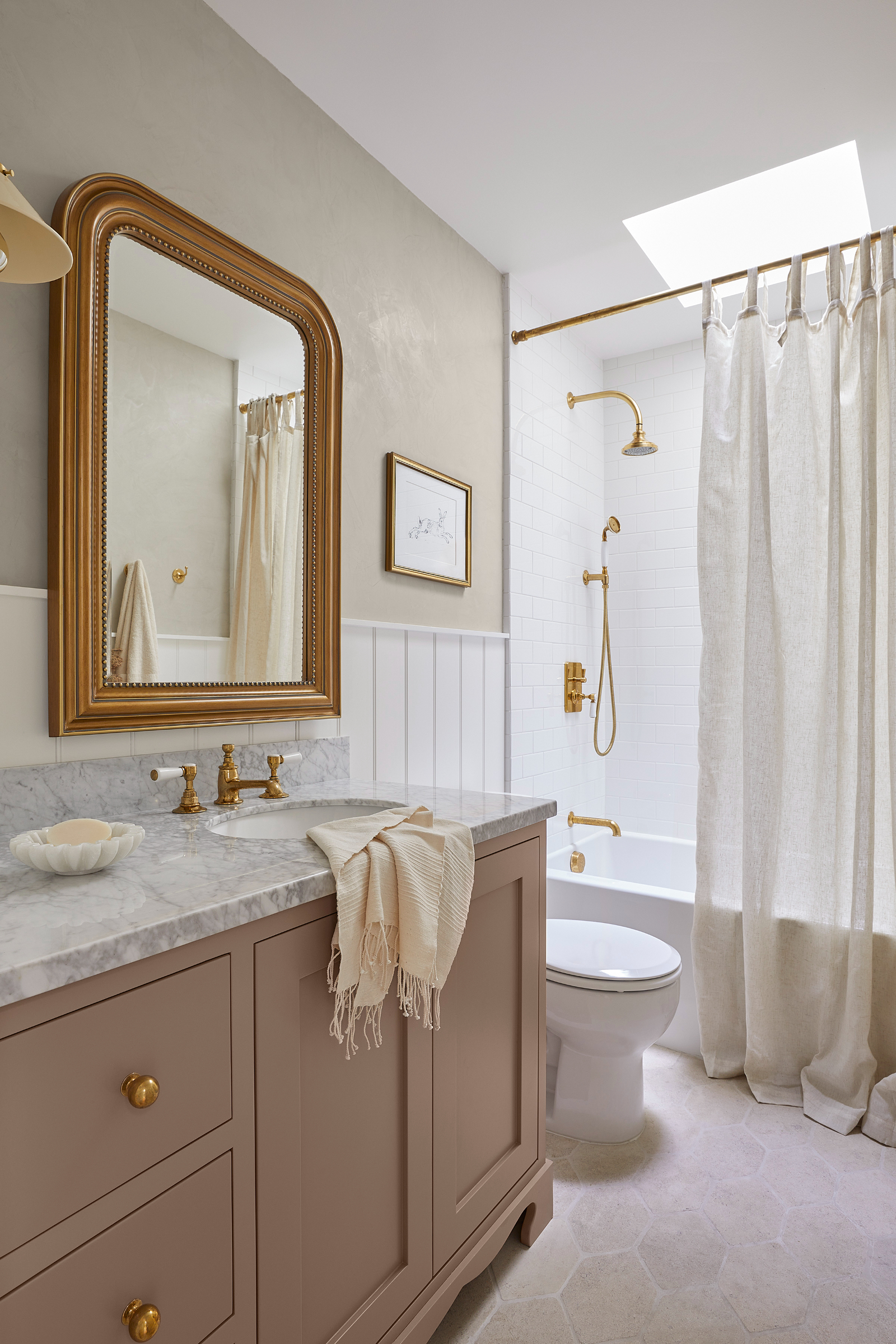
When designing a bathroom, avoid using flat materials and cold colors together as these can leave a space looking stark and lifeless; instead, opt for natural materials that feature myriad subtle textures as demonstrated in this beautiful girls’ bathroom by Adrian Dagli of IW Studio which is a masterclass in mixing materials to bring warmth and depth.
‘Our primary aim was to infuse warmth and energy into the compact space. We chose organic finishes, such as limestone bathroom floor tiles, plaster walls, and unlacquered brass, to breathe life into the surroundings,' explains Adrian Dagli.
'These materials not only instill a sense of vitality but will also develop a charming patina over time. The custom-designed mauve bathroom vanity, with its dainty vintage-inspired toe kick, helped to anchor a timeless feminine energy.'
'The custom-made wide-pleat bead board wainscoting and larger format picket tile help to create a more expansive feeling within the limited space, while softer touches like linen shower curtain create a diffused glow that enhances the ethereal ambiance.'
2. Introduce an unexpected element

Alexandra Azat, principal designer and founder of Plaster & Patina, uses a variety of devices to avoid clinical bathrooms, but most importantly she always tries to incorporate an element of surprise, as demonstrated here with the beautiful chintzy floral wallpaper.
‘The way we avoid spaces feeling sterile is often through three methods. The first is layering throughout a space, meaning, elements are carefully collected to create depth,’ explains Alexandra Azat. ‘The second is to include natural tones and materials, for example, Carrara marble tends to lean cold, but here we carefully highlighted the warm undertones of the marble mosaic floor through the wall color - Farrow & Ball’s Drop Cloth.’
‘Lastly, we always try to add an unexpected element to a room that makes it feel "alive". Here we did this with a bold floral wallpaper which jumps out next to the neutral details. Unlike the linear wainscoting and the hexagonal tiled floor, the wallpaper is free-flowing and softens the geometric shapes around it.’
3. Choose a warm wall color
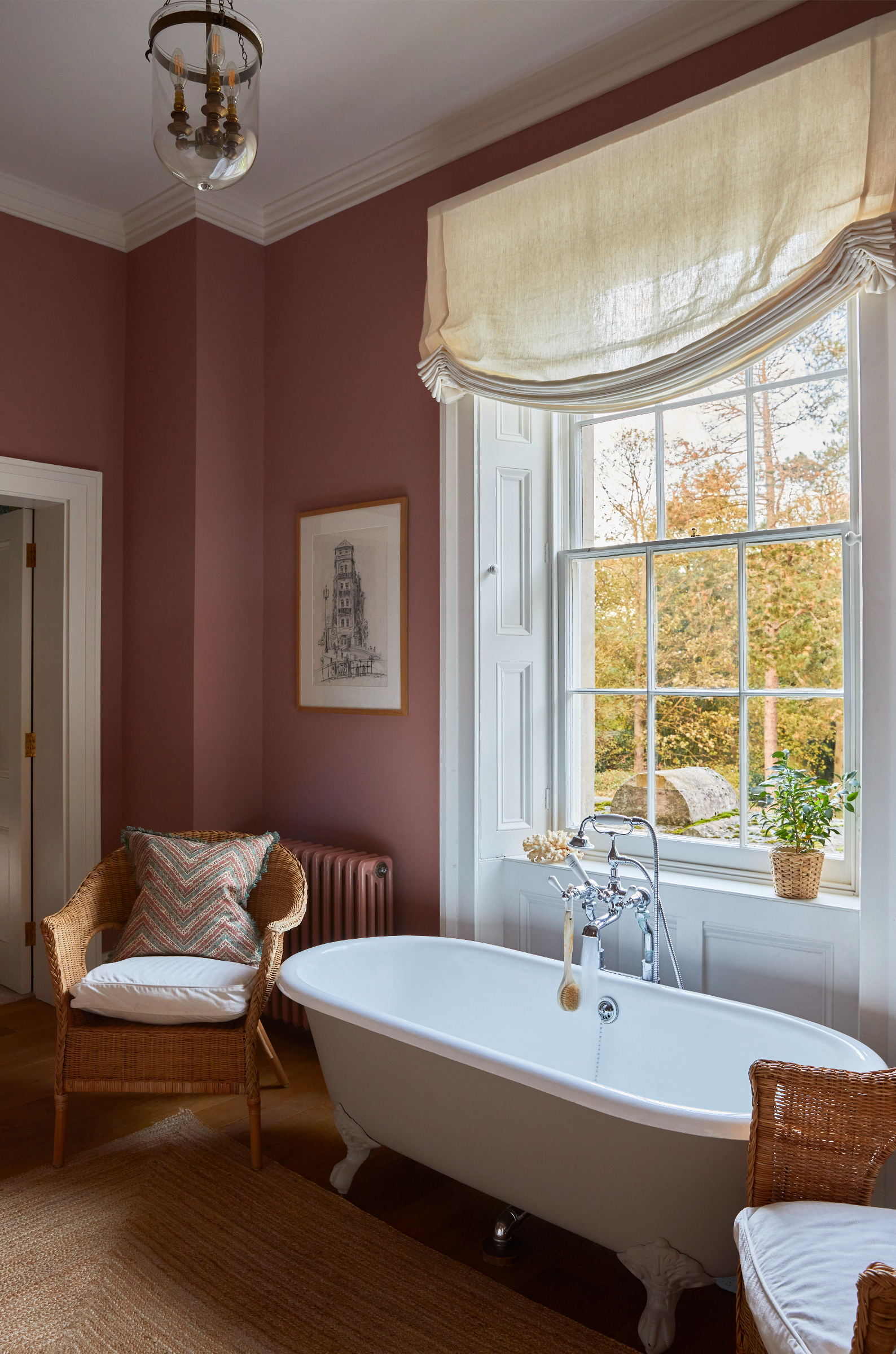
Increasingly we are seeing warm, earthy pinks embraced in practical spaces like kitchens and bathrooms. Feminine and gentle, pink brings subtle warmth to a room and it works well with greens, blues, creams and natural materials like wood and wicker.
In this traditional bathroom, Suzannah Lockwood chose Blush paint for the walls by Little Greene. ‘I love a muted pink used as a neutral, it is such a peaceful color for any room,’ says the interior designer.
‘I think bathrooms should be designed like any other room in a home; to enhance the experience of spending time in them. Antique furniture, gathered lampshades, an upholstered chair, wallpaper and plants, all soften the functionality and add to the enjoyment. A candle-lit bath in a beautiful room, is a total joy,’ adds Suzannah Lockwood.
Using too many cold colors in a bathroom can easily leave it feeling sterile so take care when choosing wall color and be sure to get the balance right between warm and cool tones. Before deciding on a wall color consider the orientation of the room and the amount of light it receives.
4. Layer subtle neutral tones
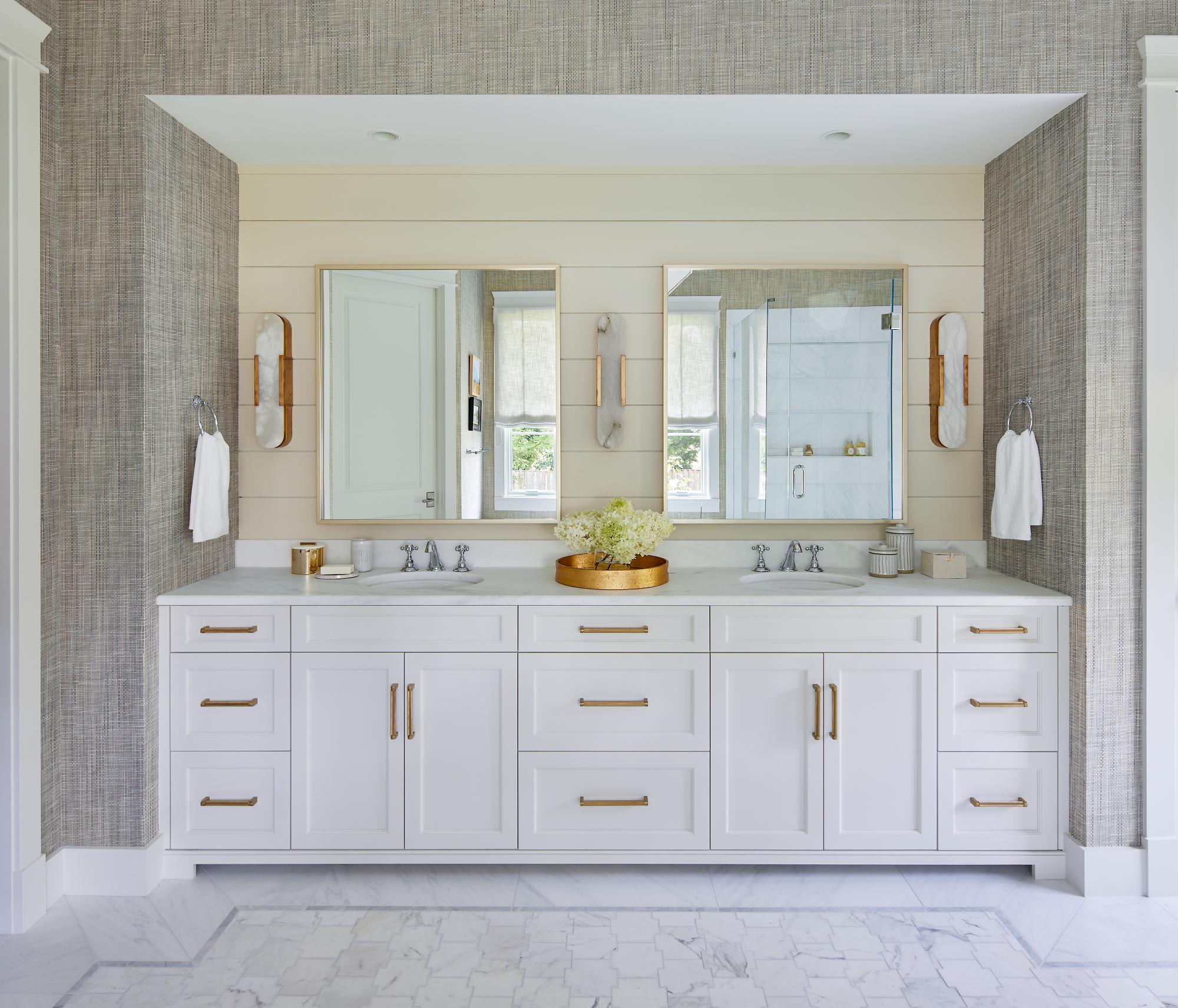
Designing a bathroom that doesn't feel sterile doesn’t mean you have to abandon white altogether. Neutrals work wonderfully in bathrooms as they are both relaxing and uplifting, plus they are a fail-safe way to maximize space in small bathrooms.
The key when decorating with white and neutrals in a bathroom is to layer myriad subtle tones and to ensure that you introduce plenty of texture advises interior designer Tracy Morris. ‘If your space is well-ventilated, think about adding a textured wallpaper - the texture will add much-needed warmth to the walls.'
5. Add a feature wallpaper
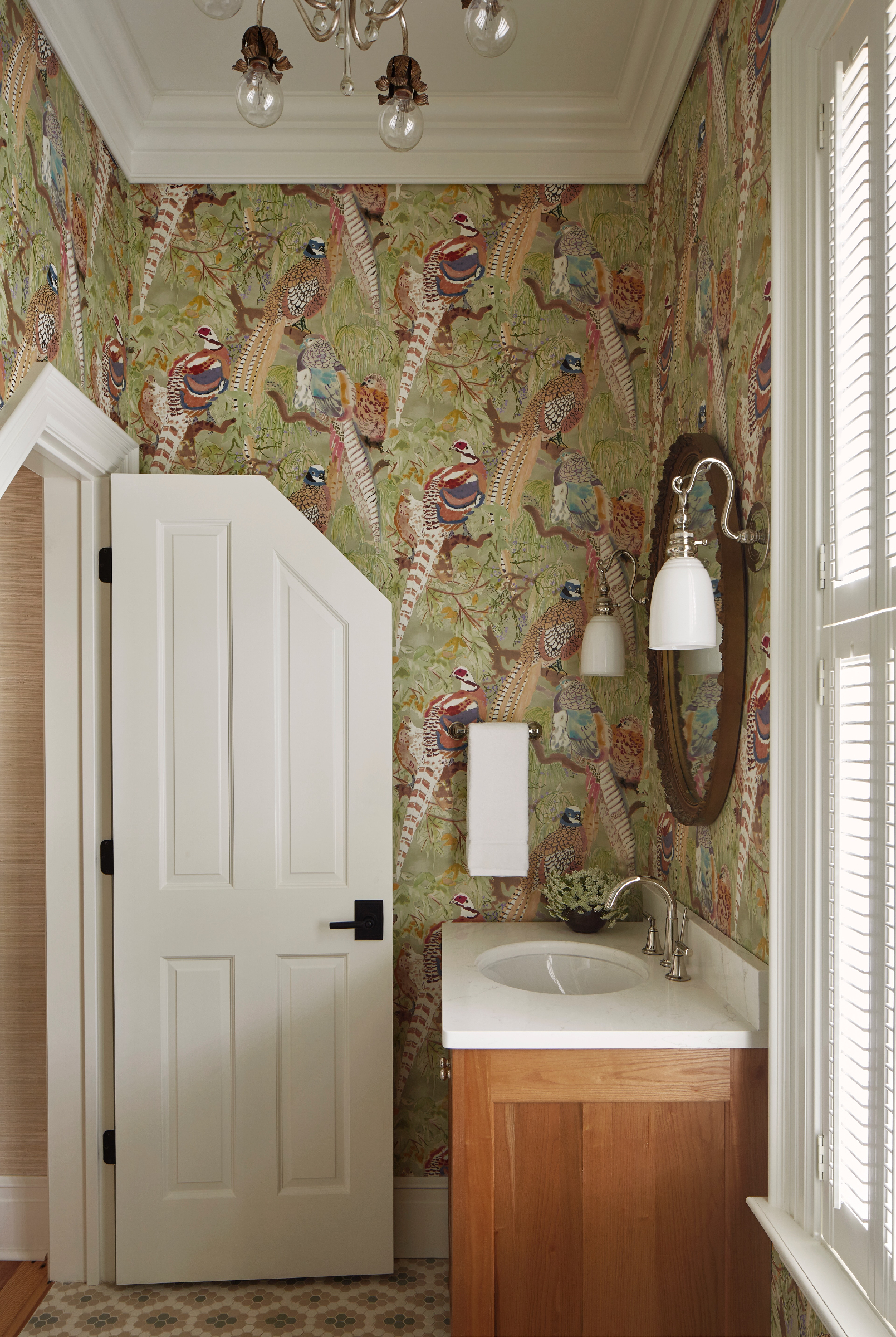
Wallpaper needn't be reserved for bedrooms and living spaces. Provided your bathroom is well-ventilated and the wallpaper is hung in a splash-free area, wallpapers can be a fabulous way to bring life to bathrooms. Bathroom wallpapers work particularly well in cloakrooms and guest bathrooms which are not exposed to as much moisture. Alternatively, there are water-resistant designs available.
‘Adding a touch of whimsy, in this case the pheasant wallpaper, prevents this bathroom from feeling uninspired,’ says interior designer Kate Ladd Chlebowski, founder of Vernacular Studio.
‘The warmth of the wood vanity adds an earthy, warm element, while the vintage chandelier above adds a touch of individuality.’
6. Embrace elegant curves

‘Bathrooms tend to be more angular and have more hard finishes than a living room for instance, so we incorporate curves and textiles anywhere we can,’ explains interior designer Emily Finch.
‘A curved, organic shape on the tub can make a world of difference, and window treatments are a great opportunity to add softness. In this space, we also included hand-troweled plaster walls and a curvaceous brass Moroccan pendant for added depth and warmth.’
7. Introduce soft ambient lighting
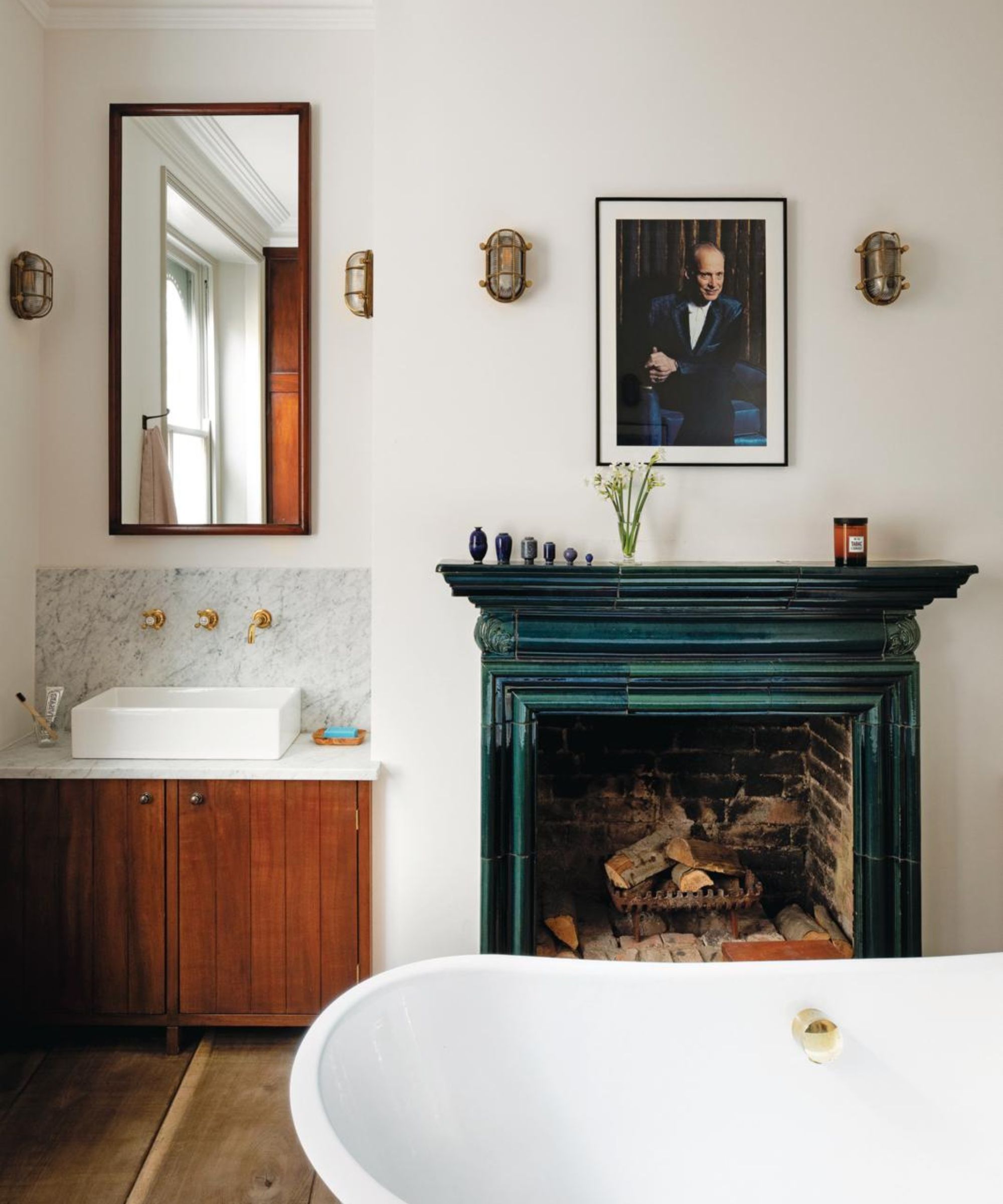
Getting bathroom lighting right is one of the most important aspects of a bathroom design as lighting has the power to completely change the mood of a room, no matter what materials and colors are used. Stark white bathrooms can be transformed with a well-thought-out layered lighting scheme which includes the soft, gentle lighting. It's also worth considering fittings with elegant designs with burnished metal fixtures to bring softness and warmth.
'Most bathrooms benefit from a central lighting source in the form of a ceiling light and a combination of practical, space saving wall lights and spotlights. Think not just about the overall lighting effect but the look of the fittings. Often, bathrooms can look austere and clinical, with rows of white cabinets and reflective surfaces. Often only recessed or concealed lighting is used, which can result in a cold, characterless space,' advises Charlie Bowles, director of Original BTC.
'Treat lighting in the bathroom as you would any living area. Bathrooms are now as much relaxation spaces as practical spaces, so consider your lighting at planning stage to maximize opportunities. If possible, make sure your lights are controlled separately so you can create different moods at the flick of a switch.'
'Asking your electrician to install several circuits means you’ll be able to introduce texture and depth, which is particularly useful in smaller bathrooms where there is often little natural light,' adds Charlie Bowles. 'You need two types of illumination: shadow-free task lighting for functional tasks such as shaving and applying make-up and ambient lighting for when you simply want to lie back and enjoy a soak.'
8. Bring warmth with metallics

Having a roll-top bath is the ultimate in traditional luxury and is a wonderful way to bring elegance to a muted space. In this attic bathroom designed by Emma Milne, the large copper bath brings lustrous texture to the compact, neutral room and radiates a warm glow throughout the space when illuminated in the evening.
‘We repurposed this gorgeous bath from another bathroom in the house, we felt the copper worked better in this cozy attic space where it has pride of place,’ says Emma Milne. ‘We paneled the walls and ceiling, painted everything in a warm neutral paint color, and painted the floorboards black to offset the glamorous finish of the tub. The overall effect is welcoming, calm and restful.’
9. Add bold color pops
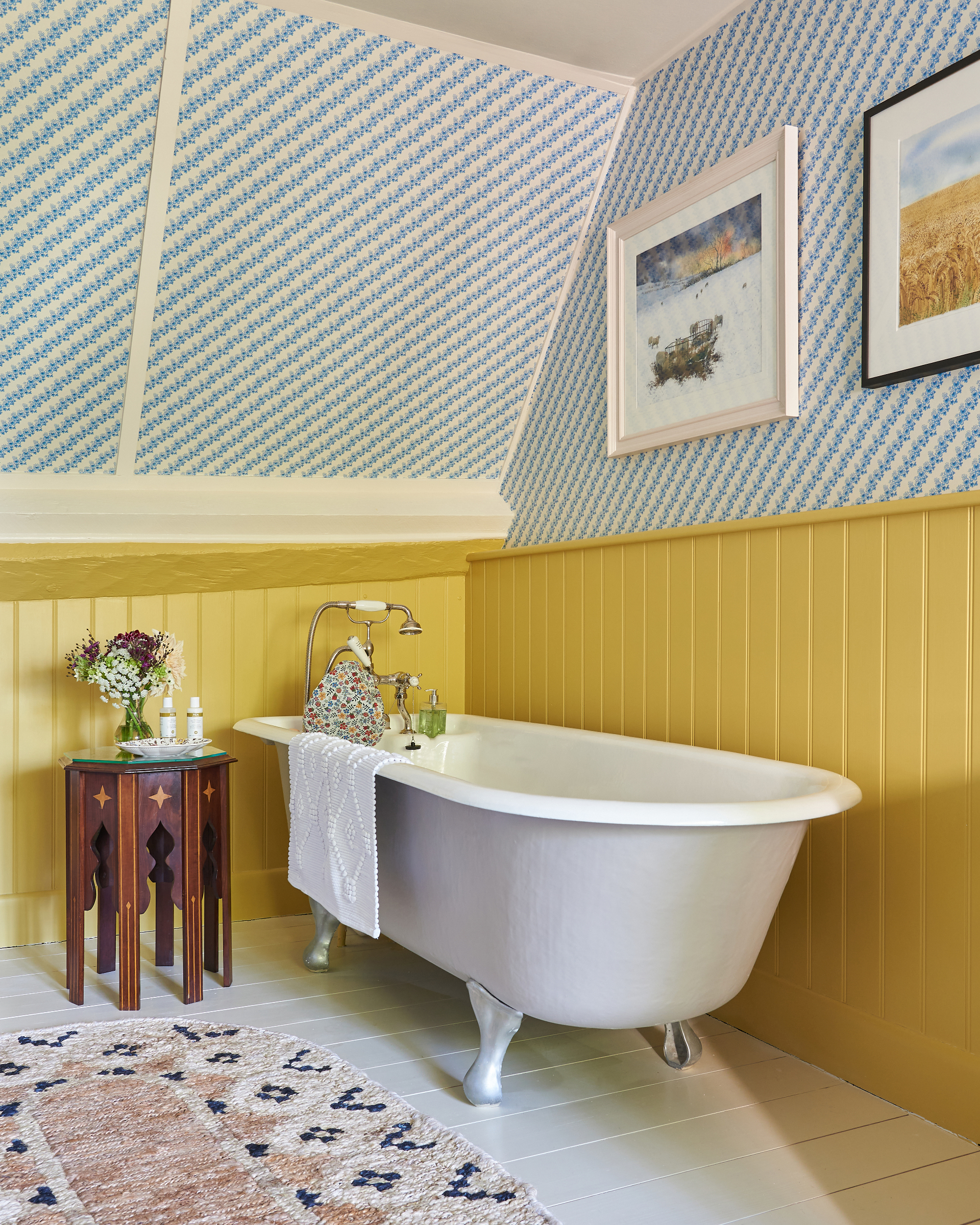
Adding a pop of vibrant color such as a happy sunshine yellow is guaranteed to lift spirits and is a wonderful way to bring instant life to small bathrooms that lack natural light, as demonstrated in this colorful bathroom by Sarah Vanrenen.
'Making bathrooms decorative with pretty wallpaper, art and decorative lighting is a good way to bring character,' says Sarah Vanrenen. 'In cases where there are no windows, there are so many amazing tiles you can use to make a bathroom interesting, and using contrasting paint colors on woodwork and skirting can help.'
‘This country bathroom is at the top floor of a very old house. We put bathroom paneling on the bottom half of the walls and used lovely diagonal paper above. We also painted the floorboards and used furniture like this lovely little Moroccan table and an old chest of drawers; it is lovely to have a table next to a bath with soap and pretty things to make the room not feel so sterile.’
10. Introduce fabrics
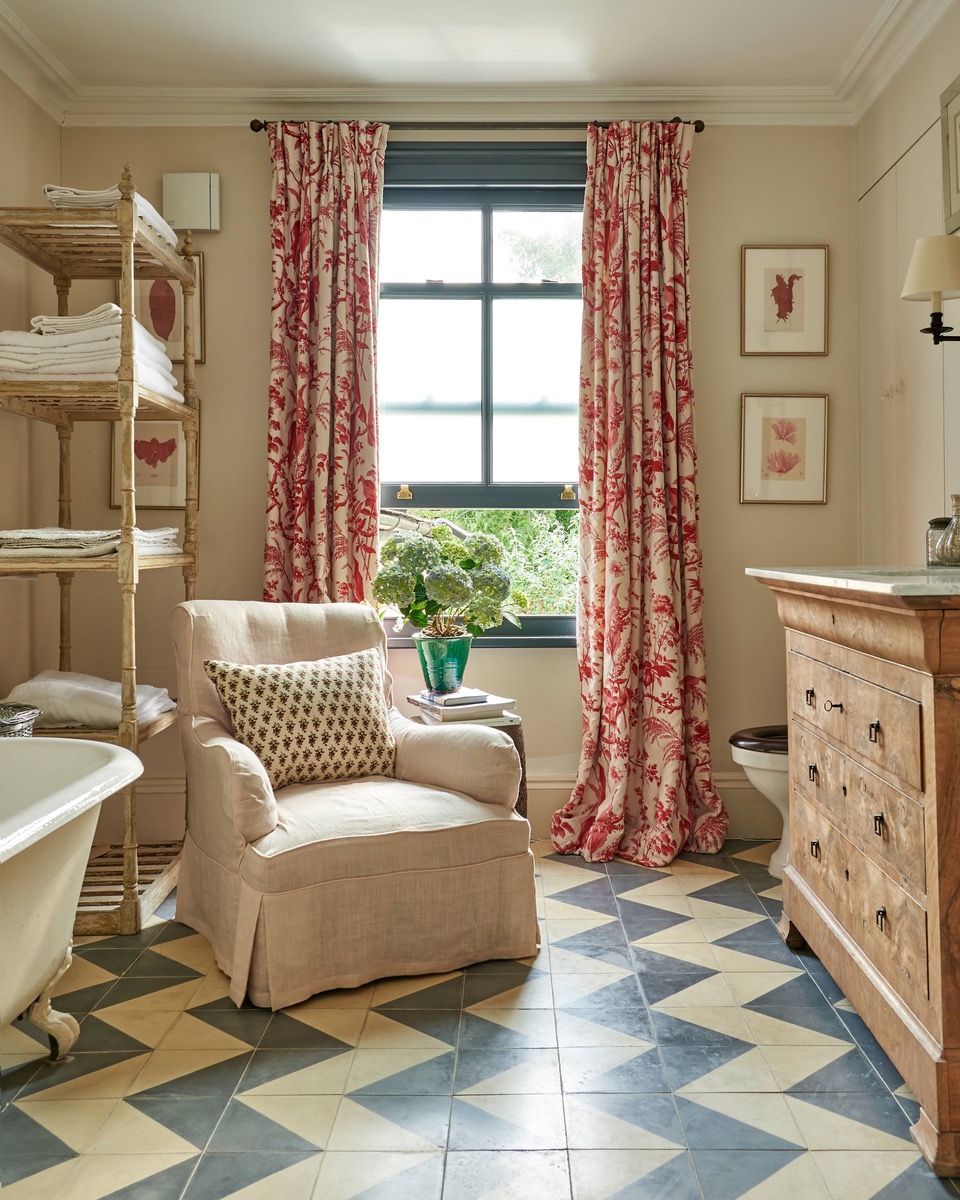
‘If possible, it’s always nice to include fabric in bathrooms, whether it’s bathroom curtains, a blind or a piece of upholstered furniture; or, if space is tight, perhaps a basin skirt,’ adds Sarah Vanrenen. ‘I am a firm believer that bathrooms should be comfortable and inviting.’
In this eclectic vintage bathroom, Sarah Vanrenen opted for floor-to-ceiling floral drapes to bring feminine charm and paired them with vintage wood furniture alongside a feature floor of chevron tiles for an edgy contrast.
11. Add in accessories
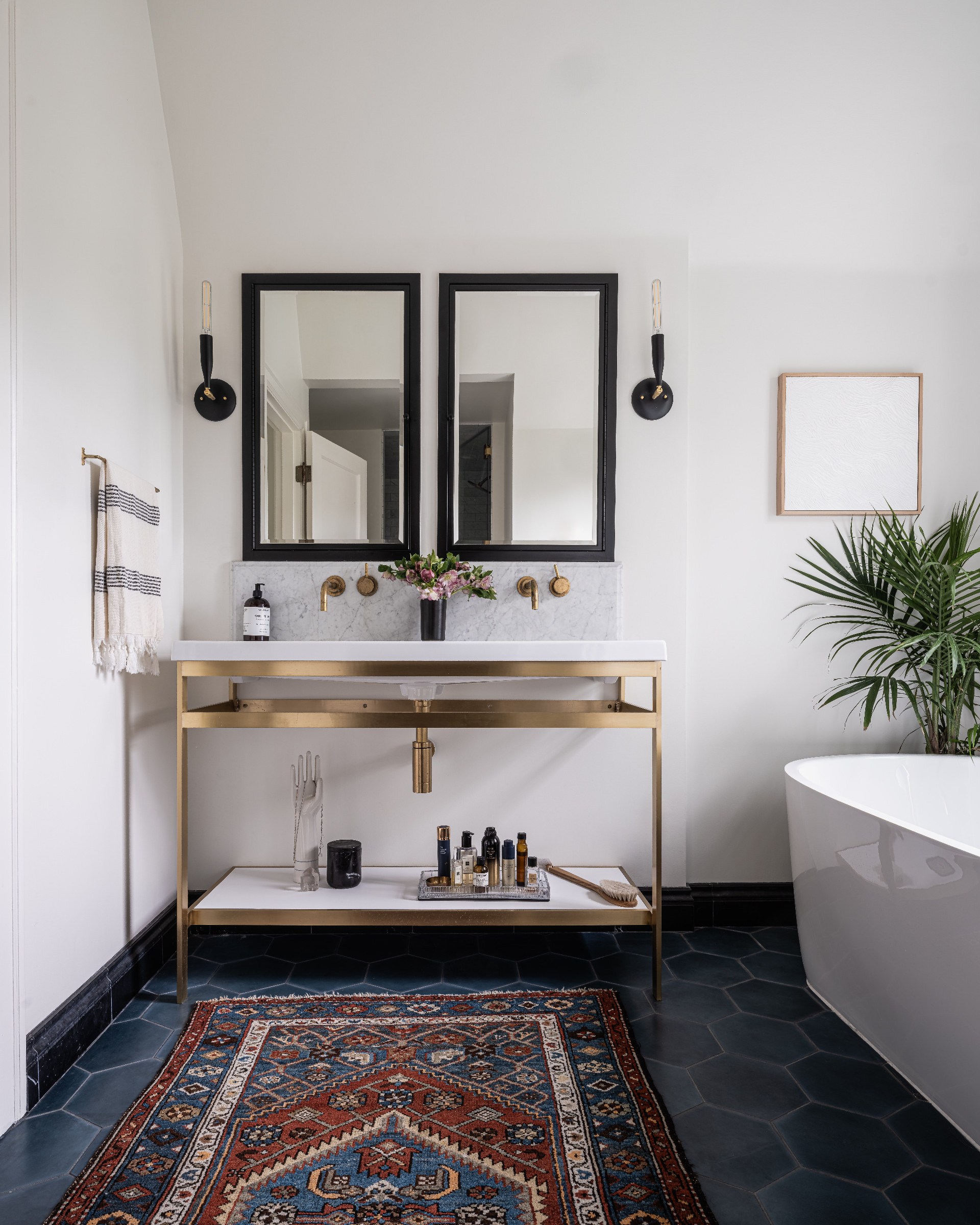
If you’re looking to add personality to an existing bathroom you can’t go wrong with plants and accessories to instantly bring vitality and character. Vintage rugs in particular will bring an aged charm inimitable with modern designs.
‘Having a bathroom that feels relaxed and inviting can be achieved by layering items like a vintage rug, art, and plants. Also, try adding something unexpected; in this case, a blue cement tile floor and a layering of metals in a curated fashion kept the space from lacking depth and warmth,’ explains interior designer Alix Day.
12. Mix and match colorful tiles
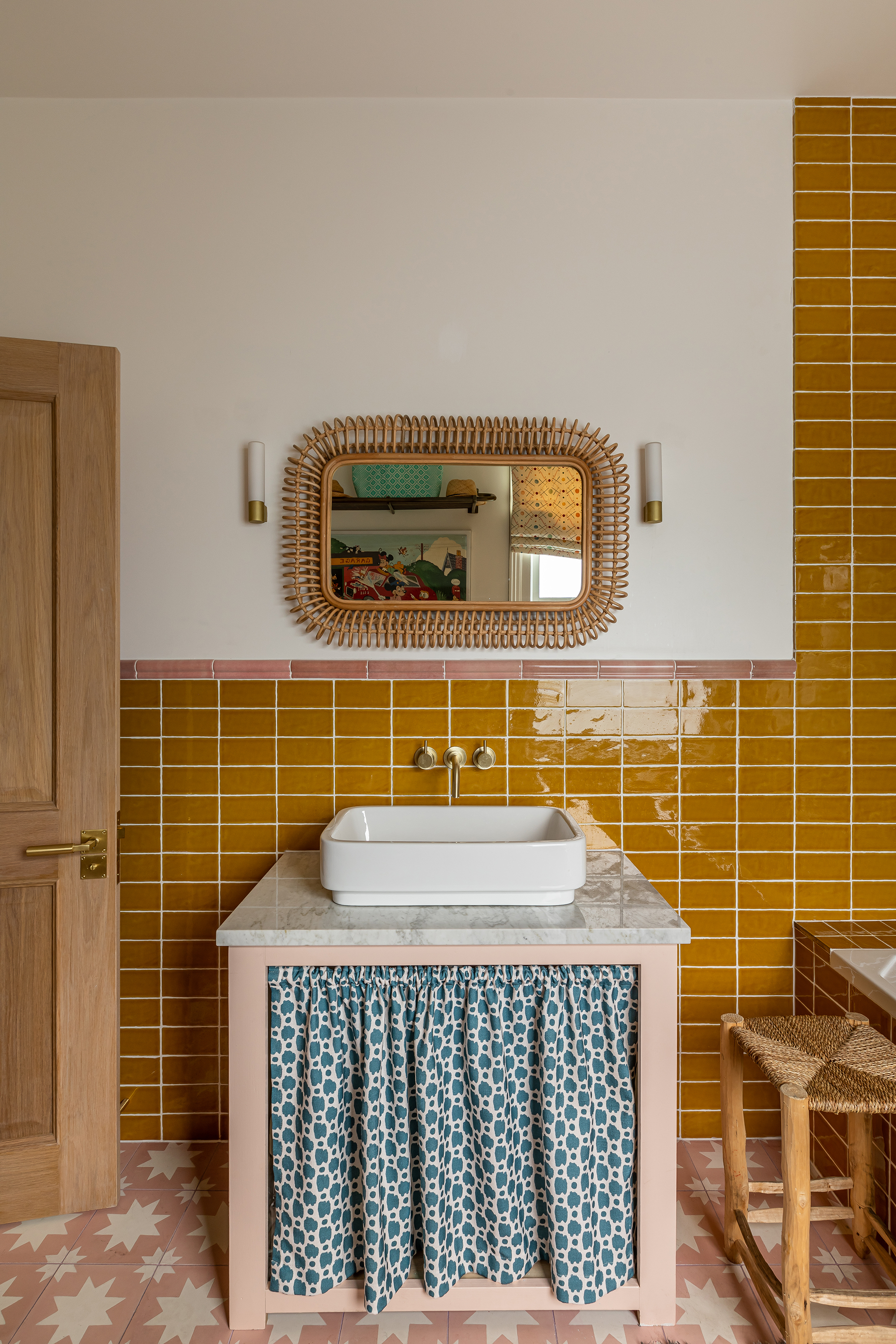
Bathroom wall tiles are a go-to way to bring personality, color and texture into a bathroom with designs ranging from vibrant patterned ceramic designs to textured natural stone and handmade zellige tiles. Not only is there a huge array of designs, shapes and sizes to choose from, tiles can also be laid in all manner of configurations to bring unique style to your space.
In this yellow bathroom, Barlow & Barlow teamed a range colorful tile designs in different shapes and laying patterns to achieve a playful and uplifting space.
How can I make my bathroom less clinical?
How can I make my bathroom less clinical?
To design a bathroom that doesn't feel clinical it's important to consider all the elements, from the treatment of the walls and flooring, to the furniture and fittings, right down to the towels and finishing touches.
Avoid using stark white on all surfaces and move away from flat, lifeless ceramics and instead layer the space with materials in an array of warm tones with subtle textures say the interior design experts. Stark white sanitryware is if often unavoidable in bathrooms, but provided these are balanced with warmer tones and texture the space can feel comforting and relaxing.
'The best way to avoid designing a bathroom that feels sterile is incorporating both warm and cool elements into the palette. If you begin to select too many items that have too many cool tones, the bathroom can begin to feel sterile,' says Kelly Emerson, senior designer at Aidan Design. 'Having a balance of both warm and cool tones is key.'
She suggests to incorporate hard surfaces with inherent warmth and texture such as 'marbles with warm colored veining, a warm wood stained cabinet or floating shelves.' When selecting a paint color, 'pick a warm linen paint to offset cooler tones and wrap the room with subtle warmth.'
How do you make a white bathroom less sterile?
If you have inherited a soulless white bathroom there are plenty of ways to make it feel less sterile without embarking on a complete bathroom redesign.
Firstly think about ways you can introduce color and texture. Painting the walls or hanging a decorative wallpaper is a great way to add instant personality. However, if the walls are covered in white tiles it can make things more tricky, in this case, adding a vanity unit in natural wood or with a bold painted finish can create a wonderful focal point. You could even try upcycling an old piece of furniture into a washstand.
Updating fixtures, fittings and hardware with brass fixtures is another subtle way to add warmth without embarking on a redesign. You could also introduce a fabric Roman blind or sink valance to soften the space.
Alternatively, for a super quick and easy update, you can't go wrong with colorful accessories like a fun patterned shower curtain or a bold bathroom mirror, bath mat or bathroom rug to brighten the space.







